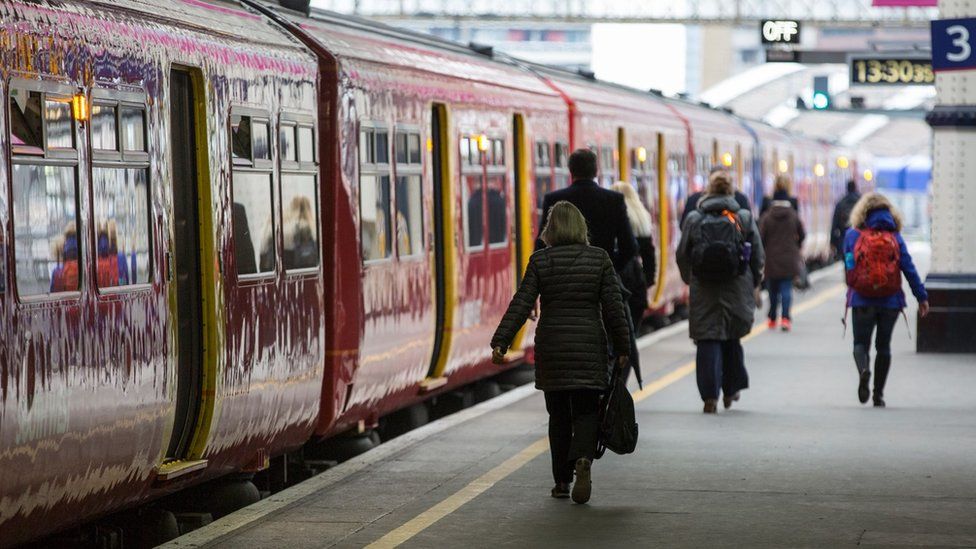
Rail services will grind to a halt in parts of the country today as a fresh wave of strikes begins.
Members of the train drivers’ union Aslef will walk out on Wednesday and again on 3 June, the day of the FA Cup Final, while members of the RMT will strike on Friday.
Aslef said there was “no waning in enthusiasm” in the long-running dispute over pay and conditions.
The government said the strikes were co-ordinated to disrupt major events.
Wednesday’s strikes will affect 15 train companies, with services due to start later and finish much earlier than usual – typically between 07:30am and 06:30.
Around 40% of trains will run but there will be wide regional variations, with some operators running no services at all.
The train operators affected on Wednesday
- Avanti West Coast
- Chiltern Railways
- CrossCountry
- East Midlands Railway
- Great Western Railway
- Greater Anglia
- Great Northern Thameslink
- Govia Thameslink Railway
- London North Eastern Railway
- Northern Trains
- Southeastern
- Southern/ Gatwick Express
- SWR depot drivers
- SWR Island Line
- TransPennine Express
- West Midlands Trains
The London Underground will not be affected by the action.
Mick Whelan, general secretary of Aslef, said train drivers were “determined to get a resolution and remain in this for the long haul”.
But he told BBC Radio 4’s Today programme that “zero” progress had been made in negotiations with the Rail Delivery Group (RDG), which represents train operators, and accused the government of being underhand.
“We go into talks in good faith, then deceitfully [the RDG] put out deals they know are destined to fail and we can’t accept.
“Ultimately, we’ll have to solve this – after four years without a pay rise my members feel they’re entitled to one, particularly during this cost of living crisis.”
Train strikes to hit FA Cup
During the RMT walkout on Friday, half of the network is set to shut down, with around 50% of normal services running.
And Aslef drivers will walk out again on Saturday, affecting the first ever all-Manchester FA Cup final at Wembley and the Scottish cup final at Hampden Park.
That strike will also impact Beyoncé’s Renaissance world tour concert in London; the England v Ireland cricket test match at Lord’s; and some 100,000 horse racing fans travelling to Epsom for the Derby.
Image source, Reuters/Getty Images
Saturday’s strike will affect the FA Cup final
It is likely that evening services on some lines will be affected on the days before each strike, so passengers are advised to check the last train times on the evenings before strike days and the mornings following strikes.
Mr Whelan denied this weekend’s strikes had been planned to coincide with major events, adding that there was not “a day in this country when there’s not a pop concert or something going on”.
But an RDG spokesperson said the walkouts would cause “disappointment and frustration for tens of thousands of people” and inconvenience families travelling for the half-term holidays.
A spokesperson for the Department for Transport added that the unions forced their members to miss out on pay every time they strike.
“The government has facilitated a fair and reasonable pay offer, now union leaders must do the right thing and put this to their members,” they added.
Both Aslef and the RMT say they have not been given a pay offer they can recommend to their members.
The cost of living is rising at its fastest rate in nearly 40 years and unions say wages have not kept pace.
The most recent offer which Aslef’s leadership has rejected involves a 4% pay rise in year one and a further increase of 4% in year two, conditional on the union accepting changes to ways of working.
They include changes to driver training and Sunday working commitments, as well as giving employers control over rotas.
Are you affected by the train strikes? Are you taking part in the industrial action? Share your experiences by emailing haveyoursay@bbc.co.uk.
Please include a contact number if you are willing to speak to a BBC journalist. You can also get in touch in the following ways:
If you are reading this page and can’t see the form you will need to visit the mobile version of the BBC website to submit your question or comment or you can email us at HaveYourSay@bbc.co.uk. Please include your name, age and location with any submission.








